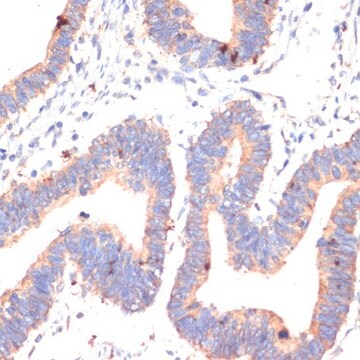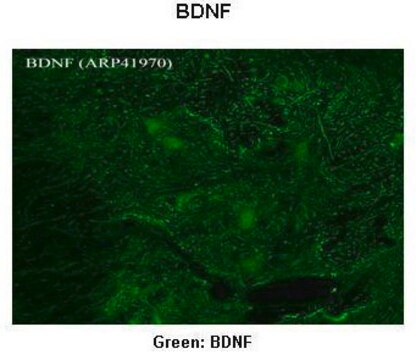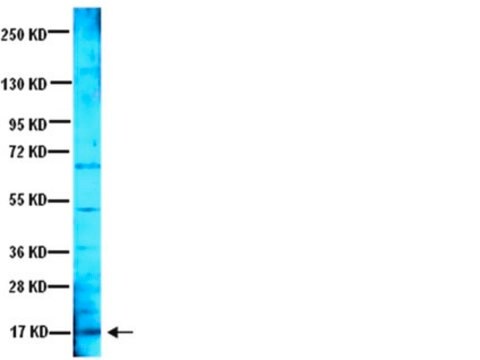MABF2096
Anti-Norovirus (MNV-1) Antibody, clone 4F9.4
clone 4F9.4, from mouse
Synonym(s):
MNV-1, Murine Norovirus
Sign Into View Organizational & Contract Pricing
All Photos(1)
About This Item
UNSPSC Code:
12352203
eCl@ss:
32160702
NACRES:
NA.41
Recommended Products
biological source
mouse
antibody form
purified antibody
antibody product type
primary antibodies
clone
4F9.4, monoclonal
species reactivity
norovirus (murine), virus
packaging
antibody small pack of 25 μg
technique(s)
ELISA: suitable
neutralization: suitable
western blot: suitable
isotype
IgAκ
UniProt accession no.
target post-translational modification
unmodified
Related Categories
General description
Norovirus is a member of the Caliciviridae family and is responsible for gastroenteritis outbreaks. Murine norovirus (MNV-1) that is about 28 to 35 nm in diameter, shares many biochemical and genetic features with human noroviruses. An analysis of the MNV-1 genome shows three open reading frames (ORF) that are characteristic of noroviruses and vesiviruses. ORF1 is reported to encode a predicted 187 kDa polyprotein that contains the 2C helicase, 3C protease, and 3D polymerase motifs. ORF2 encodes a 59 kDa capsid protein that can self-assemble into virus-like particles when expressed in a baculovirus expression system. ORF3 is reported to encode a putative 22 kDa basic protein. The norovirus capsid protein contains a highly conserved shell (S) and protruding (P) domain and the P domain is shown to contain binding sites for receptors and neutralizing antibodies. The S domain is shown to be highly conserved and the capsid sequence diversity is limited to the P domain. MNV-1 infection is reported to modulate the MAPK pathway to activate eIF4E phosphorylation and the activation of p38 and Mnk during MNV-1 infection is considered to be important for its replication. This monoclonal antibody, clone 4F9.4, recognizes the P domain portion of the viral capsid protein and effectively neutralize MNV-1 and WU20 strains. It can also neutralize recombinant viruses V339I and D348E at higher doses. (Ref.: Kolawole, AO et al. (2014). J. Gen. Virol. 95(9); 1958-1968).
Specificity
Clone 4F9.4 specifically targets capsid protein of murine norovirus.
Immunogen
Infectious murine norovirus-1
Application
Anti-Norovirus (MNV-1), clone 4F9.4 Antibody, Cat. No. MABF2096, is a mouse monoclonal antibody that detects Norovirus (MNV-1) and has been tested for use in ELISA, Neutralizing, and Western Blotting.
Neutralizing Analysis: A representative lot neutralized murine norovirus (MNV-1) in Dulbecco s modified Eagle′s medium (DMEM) (Courtesy of Abimbola Kolawole, Ph.D. and Christiane Wobus, Ph.D., University of Michigan Medical School, Ann Arbor, Michigan USA).
ELISA Analysis: A representative lot detected Norovirus (MNV-1) in ELISA applications (Kolawole, A.O., et. al. (2014). J Gen Virol. 95(Pt 9):1958-68).
Neutralizing Analysis: A representative lot effectively neutralized Norovirus (MNV-1) in Neutralizing applications (Kolawole, A.O., et. al. (2014). J Gen Virol. 95(Pt 9):1958-68).
Western Blotting Analysis: A representative lot detected Norovirus (MNV-1) in Western Blotting applications (Kolawole, A.O., et. al. (2014). J Gen Virol. 95(Pt 9):1958-68).
ELISA Analysis: A representative lot detected Norovirus (MNV-1) in ELISA applications (Kolawole, A.O., et. al. (2014). J Gen Virol. 95(Pt 9):1958-68).
Neutralizing Analysis: A representative lot effectively neutralized Norovirus (MNV-1) in Neutralizing applications (Kolawole, A.O., et. al. (2014). J Gen Virol. 95(Pt 9):1958-68).
Western Blotting Analysis: A representative lot detected Norovirus (MNV-1) in Western Blotting applications (Kolawole, A.O., et. al. (2014). J Gen Virol. 95(Pt 9):1958-68).
Research Category
Inflammation & Immunology
Inflammation & Immunology
Quality
Isotype testing: Identity Confirmation by Isotyping Test.
Isotyping Analysis: The identity of this monoclonal antibody is confirmed to be mouse IgA by isotyping testing.
Isotyping Analysis: The identity of this monoclonal antibody is confirmed to be mouse IgA by isotyping testing.
Target description
187.47 kDa calculated.
Physical form
Format: Purified
Purified by size-exclusion chromatography
Purified mouse monoclonal antibody IgA in PBS with 0.05% sodium azide.
Storage and Stability
Stable for 1 year at 2-8°C from date of receipt.
Other Notes
Concentration: Please refer to lot specific datasheet.
Disclaimer
Unless otherwise stated in our catalog or other company documentation accompanying the product(s), our products are intended for research use only and are not to be used for any other purpose, which includes but is not limited to, unauthorized commercial uses, in vitro diagnostic uses, ex vivo or in vivo therapeutic uses or any type of consumption or application to humans or animals.
Not finding the right product?
Try our Product Selector Tool.
Certificates of Analysis (COA)
Search for Certificates of Analysis (COA) by entering the products Lot/Batch Number. Lot and Batch Numbers can be found on a product’s label following the words ‘Lot’ or ‘Batch’.
Already Own This Product?
Find documentation for the products that you have recently purchased in the Document Library.
Our team of scientists has experience in all areas of research including Life Science, Material Science, Chemical Synthesis, Chromatography, Analytical and many others.
Contact Technical Service






